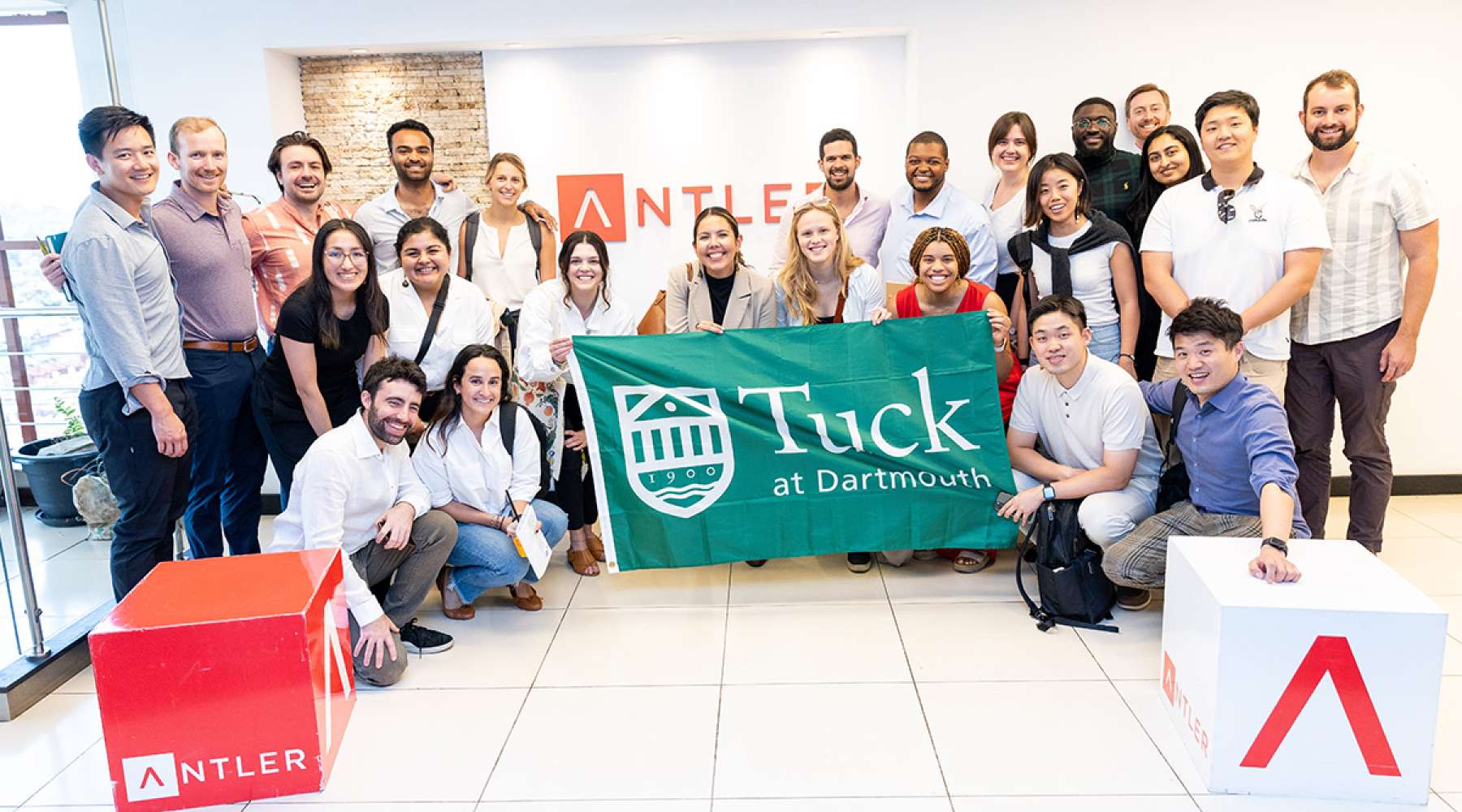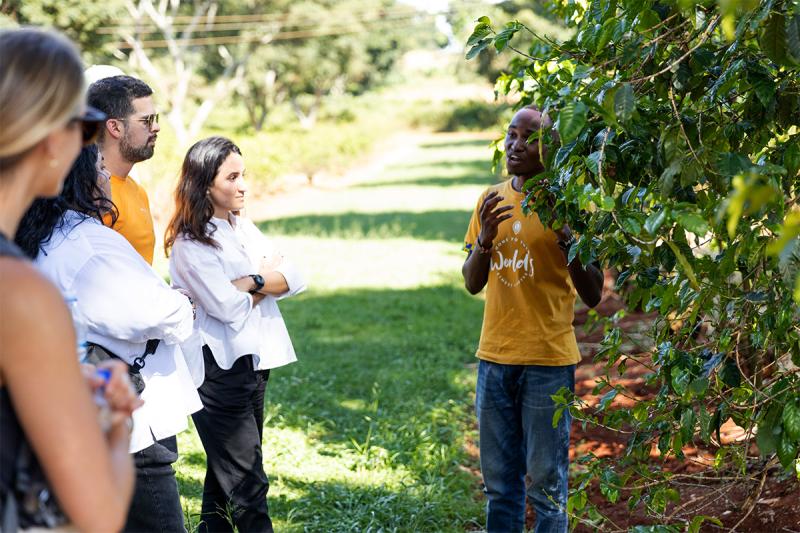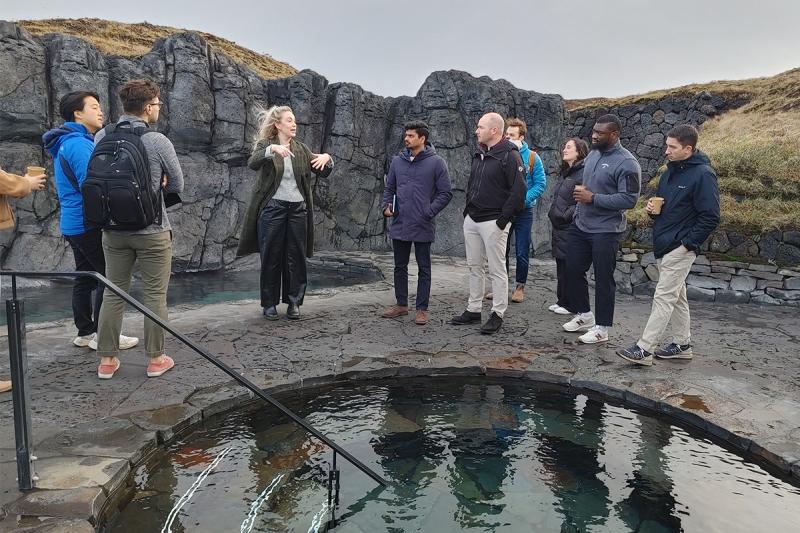
Vidya Krovvidi T’24 and Zoe Kaslow T’25 reflect on their Tuck Global Insight Expedition (GIX) experiences. Vidya joined Tuck’s Ramon Lecuona in Kenya to explore social venture startups, while Zoe chose Hanne Larsen’s course on what drives social change in Iceland.
Vidya Krovvidi T’24
What interested you about the GIX location and topic?
It was an easy pitch. We had the opportunity to collaborate with amazing social venture startups, engage with a small group of classmates, go on a safari, participate in a startup pitch competition, delve into emerging economies, and even meet a US Ambassador—all while in Kenya alongside Professor Ramon. What interested me most about the trip was that it offered insights into the resilience and creativity of businesses operating within different ecosystems and institutions. After reading about the characteristics that distinguish emerging markets from developed economies, it was interesting to observe how countries like Kenya’s institutional and economic landscapes are not merely seen as constraints for profitable businesses but attributes that allow social venture startups to solve problems and help many people.
When I attended the information session, I realized that this program was specially crafted for us, offering more than just a visit to Kenya. It provided an immersive experience in experiential learning through business. Having the chance to work with social venture startups, work with professionals growing their businesses on the ground, and conduct field visits and surveys to understand customer motivations felt like a rare opportunity for business students. By offering students a choice of startups from Hello Tractor in the agricultural sector, to Craydel in the education industry, we all participated in the curation of our own experience.

What site visits, tours, meetings, and/or people were most impactful for you during the GIX?
The most impactful experience for me was a field visit to Nakuru to interview ecosystem players for Hello Tractor, the company that I was working with. To map the ecosystem of tractor rentals, my team and I had the opportunity to engage with farmers, brokers, tractor owners and operators, and booking agents who facilitated connections between farmers and the Hello Tractor application. These one-on-one conversations provided me with a deeper understanding of the economy and the ecosystem in which they operated. They also helped me understand the many considerations that go into deciding what crop to farm, whether to rent a tractor and how the crops should be sold. The complexity and nuances of the agricultural industry in Kenya, the barriers to automation, and the culture of resourcefulness and finding alternatives in the face of structural barriers were things that I could only fully appreciate after being there and speaking to people. Every stakeholder, from the farmers to the brokers to the startup itself, had considered their incentives and alternatives and had a solid understanding of how they approached their interests. Once I gained the cultural understanding required for these startups to build their niches and grow their company in a way that benefitted the most people, I could better appreciate the sophistication and creativity of the startups’ business practices.
How did Tuck faculty and/or staff contribute to your overall GIX experience?
We were accompanied by a fantastic team of faculty and staff who significantly enhanced both our experience and our learning. Phil Barta, Professor Ramon, Lisa Miller, and Vincent Mack were fantastic. They asked questions that we would not have thought to ask, kept us on track with our deliverables and tasks, and switched between organizational and supervisory hats as needed. All the members of staff and faculty acted as resources whom we could approach as a sense-check for our approaches to the problems and our solutions. Professor Ramon was especially fantastic. Before the trip, he had built relationships with the companies, coordinated logistics, managed expectations regarding deliverables, and generated goodwill. This helped the startups feel more comfortable sharing information with us, enhancing our insights, and enabling us to make better recommendations.
What should prospective students know about the GIX and/or TuckGO requirement?
The GIX is an amazing opportunity, offering more than just the chance to see interesting places but also the opportunity to meet fascinating people. To future students: I highly recommend completing a project-based GIX. It not only enhances your learning but also enables you to build connections with people who can share their lived experiences of a place you only have a short time to explore and understand. Overall, any GIX is invaluable for the insight that it gives you into the interesting and creative ways that people conduct business in different parts of the world.

Vidya is a second-year Tuck student from Singapore with a background in consulting and finance. After earning her undergraduate degree in Economics from the University of California, Los Angeles (UCLA), she worked as an Economic and Financial Consultant with a focus on valuation for disputes. Following Tuck, Vidya plans to continue to work in Investment Banking in New York.
Zoe Kaslow T’25
What interested you about the GIX location and topic?
Coming from Vermont, I was curious to learn about a community that felt similar to mine but had clear cultural differences. Both places have roughly the same size population, similar levels of homogeneity within the population, a beautiful, natural landscape, and a commitment to social change. While they share those similarities, Iceland’s history plays a critical role in shaping the culture and driving social change. Although Iceland prides itself on its Viking culture, it began modernizing after World War II. While Iceland as a country has existed for a long time, its culture of gender equality is relatively new. Embarking on the GIX trip, I wanted to learn more about what drove that change.

Share one ah-ha moment during your GIX.
While preparing for the trip, our professor Hanne Larsen shared insights on Iceland’s pool culture. Additionally, in our pre-trip readings, we read about the history and rationale for the profound connection to pools. This includes Iceland’s access to affordable geothermal energy, a dark history of drownings prompting investment in swim lessons, and the pool’s place in the “town square” of a community. I decided to lean deeply into this cultural experience, and I committed to going to the pools every day, even before we arrived in Iceland.
Unlike American pool locker rooms, the Icelandic locker rooms are dry, and swimmers undress fully before showering to go into the pool. At first, I was a little shocked. However, once I allowed myself to lean in, I loved the experience of getting ready to enter the pool. And, the water is so warm! As soon as I stepped into a 98-degree wading pool, it clicked for me why pool culture was so important. It is an extremely relaxing pastime, even with an outside temperature of 32 degrees Fahrenheit and rain on your face. I went every day, sometimes waking up early to swim before class or stopping by at 9:00 p.m. on a Sunday. I highly recommend visiting the pools if you’re in Iceland!
What should prospective students know about the GIX and/or TuckGO requirement?
I loved my GIX experience! I highly recommend that first-year Tuck students consider going during their March break. I didn’t know too many people before joining the trip, but I made so many new friends that I might not have otherwise met on campus. It allowed me to be more open to the social experience, and it was a pivotal experience for me at Tuck.

Zoe Kaslow is a first-year student at Tuck who is here with her husband, two-year-old son, and two cats. Before coming to Tuck, Zoe worked in the nonprofit sphere for eight years, most recently as a fundraiser. She will be interning at New Balance as a strategy intern this summer. She loves playing Tripod, going to dinner at FoCo, and getting to know her Tuck classmates!